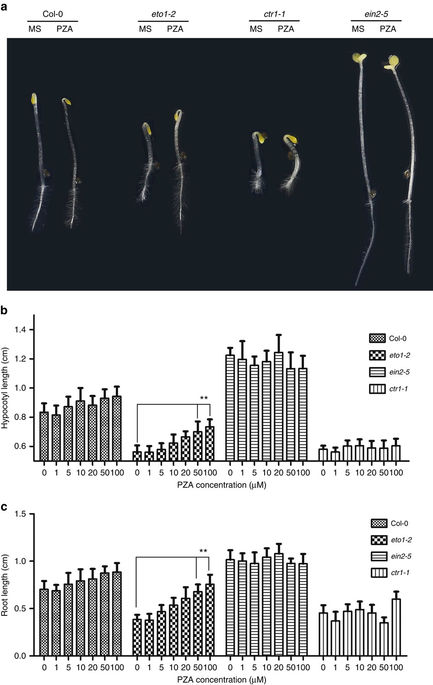当前位置:
X-MOL 学术
›
Nat. Commun.
›
论文详情
Our official English website, www.x-mol.net, welcomes your
feedback! (Note: you will need to create a separate account there.)
Pyrazinamide and derivatives block ethylene biosynthesis by inhibiting ACC oxidase.
Nature Communications ( IF 14.7 ) Pub Date : 2017-06-12 , DOI: 10.1038/ncomms15758 Xiangzhong Sun , Yaxin Li , Wenrong He , Chenggong Ji , Peixue Xia , Yichuan Wang , Shuo Du , Hongjiang Li , Natasha Raikhel , Junyu Xiao , Hongwei Guo
Nature Communications ( IF 14.7 ) Pub Date : 2017-06-12 , DOI: 10.1038/ncomms15758 Xiangzhong Sun , Yaxin Li , Wenrong He , Chenggong Ji , Peixue Xia , Yichuan Wang , Shuo Du , Hongjiang Li , Natasha Raikhel , Junyu Xiao , Hongwei Guo

|
Ethylene is an important phytohormone that promotes the ripening of fruits and senescence of flowers thereby reducing their shelf lives. Specific ethylene biosynthesis inhibitors would help to decrease postharvest loss. Here, we identify pyrazinamide (PZA), a clinical drug used to treat tuberculosis, as an inhibitor of ethylene biosynthesis in Arabidopsis thaliana, using a chemical genetics approach. PZA is converted to pyrazinecarboxylic acid (POA) in plant cells, suppressing the activity of 1-aminocyclopropane-1-carboxylic acid oxidase (ACO), the enzyme catalysing the final step of ethylene formation. The crystal structures of Arabidopsis ACO2 in complex with POA or 2-Picolinic Acid (2-PA), a POA-related compound, reveal that POA/2-PA bind at the active site of ACO, preventing the enzyme from interacting with its natural substrates. Our work suggests that PZA and its derivatives may be promising regulators of plant metabolism, in particular ethylene biosynthesis.
中文翻译:

吡嗪酰胺及其衍生物可通过抑制ACC氧化酶来阻止乙烯的生物合成。
乙烯是一种重要的植物激素,可促进果实的成熟和花朵的衰老,从而缩短其保质期。特定的乙烯生物合成抑制剂将有助于减少收获后的损失。在这里,我们使用化学遗传学方法将吡嗪酰胺(PZA)(一种用于治疗肺结核的临床药物)鉴定为拟南芥中乙烯生物合成的抑制剂。PZA在植物细胞中转化为吡嗪羧酸(POA),抑制了1-氨基环丙烷-1-羧酸氧化酶(ACO)的活性,该酶催化乙烯形成的最终步骤。拟南芥ACO2与POA或2-Picolinic Acid(2-PA)(一种与POA相关的化合物)复合的晶体结构表明,POA / 2-PA在ACO的活性位点结合,阻止了酶与其天然相互作用基材。
更新日期:2017-06-12
中文翻译:

吡嗪酰胺及其衍生物可通过抑制ACC氧化酶来阻止乙烯的生物合成。
乙烯是一种重要的植物激素,可促进果实的成熟和花朵的衰老,从而缩短其保质期。特定的乙烯生物合成抑制剂将有助于减少收获后的损失。在这里,我们使用化学遗传学方法将吡嗪酰胺(PZA)(一种用于治疗肺结核的临床药物)鉴定为拟南芥中乙烯生物合成的抑制剂。PZA在植物细胞中转化为吡嗪羧酸(POA),抑制了1-氨基环丙烷-1-羧酸氧化酶(ACO)的活性,该酶催化乙烯形成的最终步骤。拟南芥ACO2与POA或2-Picolinic Acid(2-PA)(一种与POA相关的化合物)复合的晶体结构表明,POA / 2-PA在ACO的活性位点结合,阻止了酶与其天然相互作用基材。






























 京公网安备 11010802027423号
京公网安备 11010802027423号